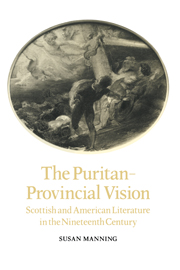Book contents
- Frontmatter
- Contents
- Preface
- Acknowledgements
- 1 Calvin's theology and the puritan mind
- 2 After Armageddon: Jonathan Edwards and David Hume
- 3 From puritanism to provincialism
- 4 The pursuit of the double
- 5 Spectators, spies and spectres: the observer's stance
- 6 ‘Is anything central?’
- Notes
- Bibliography
- Index
4 - The pursuit of the double
Published online by Cambridge University Press: 21 January 2010
- Frontmatter
- Contents
- Preface
- Acknowledgements
- 1 Calvin's theology and the puritan mind
- 2 After Armageddon: Jonathan Edwards and David Hume
- 3 From puritanism to provincialism
- 4 The pursuit of the double
- 5 Spectators, spies and spectres: the observer's stance
- 6 ‘Is anything central?’
- Notes
- Bibliography
- Index
Summary
By inquiring out of the proper way, I mean when puny man endeavours to penetrate to the hidden recesses of the divine wisdom … in order that he may understand what final determination God has made with regard to him. In this way he plunges headlong into an immense abyss, involves himself in numberless inextricable snares, and buries himself in the thickest darkness.
(John Calvin)For this is the nature of a guilty conscience, to fly and to be terrified, even when all is safe and prosperous, to convert all into peril and death.
(Martin Luther)[I] feel that every thought, every cause, is bipolar & in the act is contained the counteract. If I strike, I am struck. If I chase, I am pursued. If I push, I am resisted.
(R.W. Emerson)The paradox of the puritan–provincial mind is that it knows it cannot know the hidden truth of the ‘centre’, and yet must strive for knowledge. Inscrutable appearances both torment and fascinate. The centre of significance seems always veiled by the surfaces of nature and of language; truth and knowledge are forbidden secrets which must be fathomed in opposition to the tyrannous will at the heart of things. The puritan's or the provincial's search for knowledge is thus also a bid for independence, an attempt to shed the abject state of distanced ignorance and to live apart from the forces which seem to control existence.
- Type
- Chapter
- Information
- The Puritan-Provincial VisionScottish and American Literature in the Nineteenth Century, pp. 70 - 105Publisher: Cambridge University PressPrint publication year: 1990



